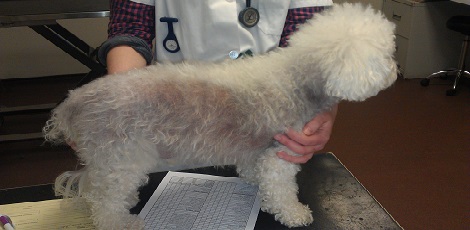World’s first immune-mediated disease clinic
The RVC has established the world’s first veterinary clinic for immune-mediated disease. The clinic is led by the Internal Medicine Service and works very closely with specialists in a range of other clinical services at the Queen Mother Hospital for Animals (QMHA).
Anaemia, joint pain, neck pain, skin ulceration, liver disease and fevers of unknown origin are just a few of the hundreds of presentations of immune-mediated diseases. These diseases can be challenging to diagnose and often require the exact opposite treatment to that needed for other diseases with similar presentations. Confidently establishing a correct diagnosis is therefore vital.
As immune-mediated diseases often affect more than one body system, the clinic team collaborates with many other specialists, including those with expertise in neurology, orthopaedics, soft tissue surgery, dermatology and ophthalmology. For very sick animals, the Intensive Care Unit delivers critical support, including the possibility for blood transfusion, haemodialysis and the removal of pathogenic antibodies from the blood (plasmapheresis).

Since immune-mediated disease sometimes turns out to be an undiagnosed infectious disease, animals visiting the new clinic also benefit from the infectious disease expertise present within the Internal Medicine Service.
Tailoring treatment of immune-mediated disease to individual patients limits the side-effects of the medicines used and maximises the effectiveness of treatment. Recent years have seen an impressive expansion of the range of drugs for immune-mediated diseases, which can no longer be treated with the traditional ‘one size fits all’ approach.
Drs Stijn Niessen and Barbara Glanemann, Co-Heads of the Internal Medicine Service, explain: “As far as we are aware there is no other referral hospital in the world offering this unique transdisciplinary service, focused on the correct diagnosis and optimal treatment of diseases caused by a dog’s or cat’s immune system becoming dysregulated. Our team contains internal medicine specialists with additional expertise in a range of immune-mediated diseases, and is therefore ideally positioned to deal with such cases.”
One of the team’s specialists is Dr Oliver Garden, Professor of Comparative Medicine and Immunology. Professor Garden adds: “Veterinary clinical immunology is fast gaining traction as a new sub-speciality within internal medicine, led by specialists at the RVC with both clinical and relevant research expertise. I am very excited to be part of this initiative, which will help to formalise our already strong credentials in this space. Our research on immune tolerance and immune-mediated disease over the past decade has led to several advances in this field, which we are now keen to bring to clinical translation.”
The Immune-Mediated Disease Clinic welcomes all enquiries from veterinary colleagues about possible referral of suitable patients. Vets can call our referral line on 01707 666365.

